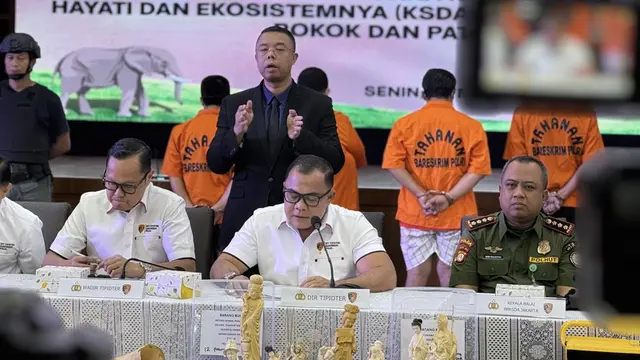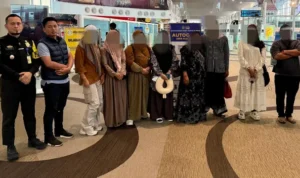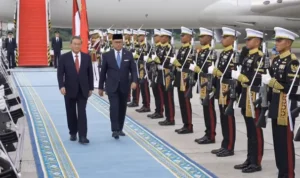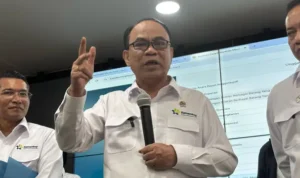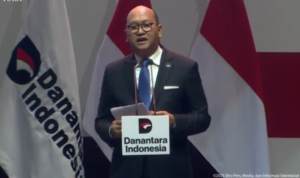INDONESIAUPDATES.COM, News En – Indonesian authorities have arrested four individuals suspected of involvement in the illegal trade of elephant ivory, with the total value of confiscated assets estimated at Rp2.3 billion. The seized items include whole tusks as well as carved ivory made into smoking pipes, command sticks, statues, and bracelets.
Brigadier General Nunung Syaifuddin, Director of Specific Crimes at the National Police’s Criminal Investigation Department (Bareskrim), revealed that the suspects—identified by initials IR, EF, SS, and JF—were apprehended in different locations: IR and EF in Cibereum, Sukabumi; SS in Cisarua, Sukabumi; and JF in Tebet, South Jakarta.
“The total estimated value of the confiscated items is approximately Rp2,384,000,000,” said Nunung during a press briefing at Police Headquarters. “However, this value may fluctuate depending on the buyer. A single elephant tusk, for example, could be worth over Rp1 billion if the right buyer is found.”
Sold Online and Offline, from Raw Tusk to Carvings
Nunung stated that the suspects marketed the ivory in various forms. In addition to selling it whole, they crafted it into smoking pipes, statues, bracelets, and ceremonial command sticks. These items were sold through both physical outlets and online platforms.
The suspects reportedly used platforms like Facebook and TikTok to advertise their products, including via the TikTok accounts 1Junior9393 and GGNK. According to police, suspect IR sourced ivory pieces from JF and marketed them via live streaming, setting prices based on the size and detail of the carvings.
“The ivory pipes were shipped to buyers using standard courier services like JNT,” Nunung added.
How the Network Operated
Suspect SS allegedly stored and traded ivory pipes through a Facebook account under the name Sony Shopian, sourcing his products from IR’s Facebook accounts Bonang and Almalik. A single ivory pipe with a diameter of 10 cm and length of 1.8 cm was sold for Rp1.2 million.
Police reports indicate that SS had previously shipped ivory products to international buyers in Malaysia and South Korea.
Meanwhile, JF was known to operate four antique kiosks on Jalan Surabaya, Menteng, Central Jakarta, where he stored and sold both raw and carved ivory items. According to his statement, he began obtaining ivory in 2020 from sources in Sentul and BSD, Tangerang.
Initially, JF sold ivory to IR at Rp8 million per kilogram. Today, depending on quality and form, the price has risen to between Rp12 million and Rp16 million per kilogram.
Facing Severe Legal Charges
All suspects will be charged under Article 40A paragraph 1 letter F in conjunction with Article 21 paragraph 2 letter C of Law Number 32 of 2024, which amends Law Number 5 of 1990 on the Conservation of Natural Resources and Ecosystems. They also face charges related to transnational wildlife crime.
The illegal trade of elephant ivory not only threatens biodiversity but also violates international wildlife protection agreements such as CITES, to which Indonesia is a signatory.
Frequently Asked Questions (FAQ) Illegal Elephant Ivory Trade Case – Indonesia
Q1: What was the total value of the illegal elephant ivory seized by police?
A1: The total value of the seized ivory and related items is estimated at approximately Rp2.384 billion (around USD 150,000), according to police authorities.
Q2: What forms did the illegal ivory take?
A2: The ivory was found in various forms, including whole tusks, smoking pipes, command sticks, carved statues, and bracelets.
Q3: Who are the suspects involved in this case?
A3: Four suspects were arrested with the initials IR, EF, SS, and JF. They were apprehended in different locations across Sukabumi and Jakarta.
Q4: How was the ivory sold?
A4: The suspects sold the ivory both offline and online. Online sales were conducted through platforms like Facebook and TikTok, including via live streaming and using accounts such as 1Junior9393 and GGNK.
Q5: Was the ivory sold internationally?
A5: Yes. One suspect, SS, admitted to having shipped ivory items to buyers in Malaysia and South Korea.
Q6: What are the legal consequences for the suspects?
A6: The suspects are charged under Article 40A paragraph 1 letter F in conjunction with Article 21 paragraph 2 letter C of Law No. 32 of 2024 (amendment of Law No. 5 of 1990) concerning the conservation of natural resources and ecosystems. They face severe penalties for involvement in illegal wildlife trade.
Q7: How much does illegal ivory sell for in the market?
A7: According to police, the price of ivory varies. Initially sold for Rp8 million per kilogram, current prices can reach Rp12–16 million per kilogram, depending on the condition and form of the ivory.
Q8: Why is trading elephant ivory illegal?
A8: Trading elephant ivory is illegal because it contributes to the endangerment and extinction of elephants, a protected species. It violates both national laws and international conservation agreements such as the CITES treaty.
FOLLOW INDONESIAUPDATES.COM ON GOOGLE NEWS

